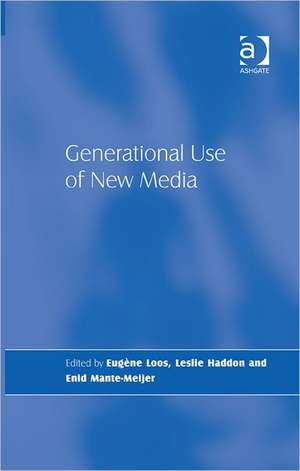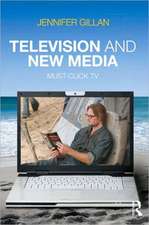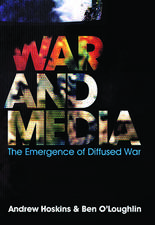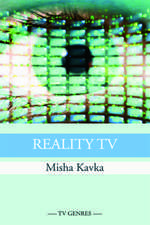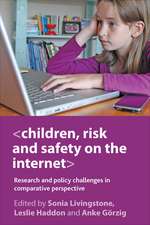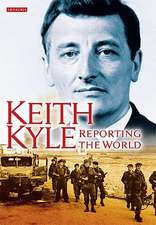Generational Use of New Media
Autor Leslie Haddon Editat de Eugène Loos Autor Enid Mante-Meijeren Limba Engleză Hardback – 28 sep 2012
| Toate formatele și edițiile | Preț | Express |
|---|---|---|
| Paperback (1) | 338.33 lei 43-57 zile | |
| Taylor & Francis – 9 sep 2016 | 338.33 lei 43-57 zile | |
| Hardback (1) | 822.54 lei 43-57 zile | |
| Taylor & Francis – 28 sep 2012 | 822.54 lei 43-57 zile |
Preț: 822.54 lei
Preț vechi: 1104.33 lei
-26% Nou
Puncte Express: 1234
Preț estimativ în valută:
157.41€ • 163.34$ • 131.57£
157.41€ • 163.34$ • 131.57£
Carte tipărită la comandă
Livrare economică 17-31 martie
Preluare comenzi: 021 569.72.76
Specificații
ISBN-13: 9781409426578
ISBN-10: 1409426572
Pagini: 236
Dimensiuni: 156 x 234 mm
Greutate: 0.6 kg
Ediția:1
Editura: Taylor & Francis
Colecția Routledge
Locul publicării:Oxford, United Kingdom
ISBN-10: 1409426572
Pagini: 236
Dimensiuni: 156 x 234 mm
Greutate: 0.6 kg
Ediția:1
Editura: Taylor & Francis
Colecția Routledge
Locul publicării:Oxford, United Kingdom
Notă biografică
Eugène Loos is Professor of Old and New Media in an Ageing Society in the Department of Communication Science at the University of Amsterdam, The Netherlands, and co-editor of 'The Social Dynamics of Information and Communication Technology' Leslie Haddon is Researcher and Associate Lecturer in the Department of Media and Communications, London School of Economics and Political Sciences, UK, and co-editor of 'The Social Dynamics of Information and Communication Technology'. Enid Mante-Meijer was Professor Emerita at Utrecht School of Governance, Utrecht University, the Netherlands, and co-editor of 'The Social Dynamics of Information and Communication Technology'.
Recenzii
'The chapter authors provide a nuanced perspective that goes well beyond the media-driven headlines and well-worn social policy tropes. By probing beneath conventional categories such as digital divides, digital natives/immigrants and generation gaps, they are able to provide one of the most sophisticated analyses to date of the relationship between age, cohort and media use. Anyone concerned about generational issues of media use will profit from reading this volume.' James E Katz, The State University of New Jersey, USA 'This incisive and wide-ranging collection offers nuanced and subtle insights into the complexities of people's uses of digital technologies, recognising that individual differences increase with age. From teenagers' experiences of parental surveillance through to the "oldest old" (85+ years), these rigorous case studies critically illuminate our relationships with digital technologies and provide ample food for thought and further research.' Lelia Green, Edith Cowan University, Australia and author The Internet: An introduction to new media 'Generational use of new media is an inspiring and worthwhile collection of research on the different ways in which various generations use new media, the problems they encounter and possible solutions to them... the research represented in the collection offers some surprising findings, particularly regarding the media competence of younger users...' Information, Communication & Society 'Carefully organized, this book is a stimulating contribution to further research and to informed policies aimed at assuring digital inclusion from pre-adolescents to the oldest olds. By refusing to consider younger and older generations as homogenous entities, the book demonstrates the need to take into account the distinct subpopulations, namely within the broader group of senior citizens.' European Journal of Communication '... a rich, critical analysis of key issues... This text provides a rich, critical analysis
Cuprins
Introduction, Eugène Loos, Leslie Haddon, Enid Mante-Meijer; Part I Young People Using New Media; Chapter 1 Parental Mediation of Internet Use: Evaluating Family Relationships, Leslie Haddon; Chapter 2 Teenagers, the Internet and Morality, Joke Bauwens; Chapter 3 Family Dynamics and Mediation: Children, Autonomy and Control, Gustavo Cardoso, Rita Espanha, Tiago Lapa; Chapter 4 Digital Natives: Discourses of Exclusion in an Inclusive Society, David Herold; Part II Barrier Free Information for Older People; Chapter 5 Being the Oldest Old in a Shifting Technology Landscape, Jan-Erik Hagberg; Chapter 6 Modelling Older Adults for Website Design, Dana Chisnell, Janice (Ginny) Redish; Chapter 7 The Ticket Machine Challenge: Social Inclusion by Barrier-free Ticket Vending Machines, Günther Schreder, Karin Siebenhandl, Eva Mayr, Michael Smuc; Part III Younger and Older People Using New Media: A Contrastive Analysis; Chapter 8 Building Intergenerational Bridges Between Digital Natives and Digital Immigrants: Attitudes, Motivations and Appreciation for Old and New Media, Giuseppe Lugano, Peter Peltonen; Chapter 9 Age and Internet Skills: Rethinking the Obvious, Alexander van Deursen; Chapter 10 Getting Access to Website Health Information: Does Age Really Matter?, Eugène Loos, Enid Mante-Meijer; conclusion Conclusion, Eugène Loos, Leslie Haddon, Enid Mante-Meijer;
Descriere
Thematically organised and offering comparative analyses of the generational use of new media and technology, this timely volume presents the latest research and rich new empirical material gathered in the EU, USA and Hong Kong, to reflect on societal practices and the practical implications of building a more inclusive information society.
